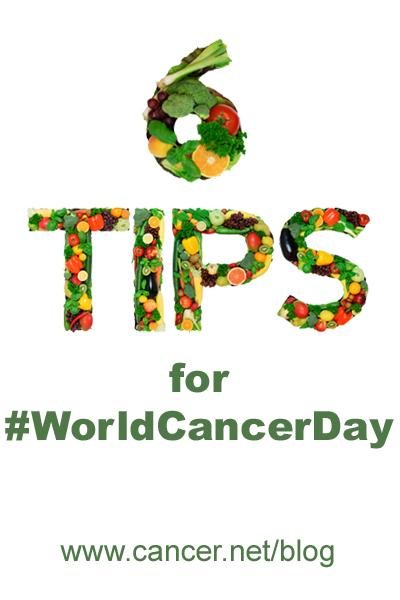
Every year on February 4, the Union for International Cancer Control works to raise awareness and educate people about cancer. On World Cancer Day 2015, the organization aims to show that cancer is “not beyond us.”  By using what we already know about cancer prevention, early detection, treatment, and care, we have the ability to prevent thousands of deaths each year.
By using what we already know about cancer prevention, early detection, treatment, and care, we have the ability to prevent thousands of deaths each year.
Currently, 8.2 million people around the world die from cancer every year. However, more than a third of the most common cancers can be prevented with healthy behaviors. It all comes down to making healthy choices and avoiding things that are known to cause cancer.
TIP 1: Eat a healthy diet, be physically active, and maintain a healthy weight.
Obesity now affects 20% to 40% of adolescents worldwide, and more than two-thirds of American adults are overweight or obese. This is an issue because being overweight or obese is strongly linked to an increased risk of developing bowel, breast, uterine, ovarian, pancreatic, esophageal, kidney, and gallbladder cancers later in life. The U.S. Department of Health and Human Services and the American Cancer Society recommend that people do moderate physical activity for at least 150 minutes each week or do vigorous physical activity for at least 75 minutes each week. To lose weight, participate in moderate to vigorous activity 60 minutes per day on most days of the week.
TIP 2: Limit the amount of alcohol you drink.
Drinking alcohol is strongly linked with an increased risk of a number of different cancers, including cancers of the mouth, pharynx, larynx, esophagus, bowel, liver and breast. The experts recommend limiting the number of alcoholic beverages you drink to one drink a day for women and two drinks a day for men. It’s important to remember that one drink is 12 ounces (oz) of beer, 5 oz of wine, or 1.5 oz of 80-proof liquor. People who have a high risk for the cancers discussed above should talk with their doctors about limiting or even avoiding alcohol to help decrease their risk.
TIP 3: Stop using tobacco.
Tobacco causes at least 22% of all cancer deaths. For people who want to stop using tobacco, a variety of medications and resources, such as counseling, are available. Your chances of successfully quitting are higher if you use a comprehensive plan that includes steps such as setting a quit date, developing strategies to deal with situations that make you want to use tobacco, and building a support system. Talk with your doctor about which approach may work best for you.
TIP 4: Protect your skin from UV radiation.
Excessive exposure to ultraviolet (UV) radiation is a major risk factor for most types of skin cancer. It is important to avoid tanning beds or sunlamps and to minimize the amount of time you spend in the sun between 10:00 AM and 4:00 PM, when the sun's rays are the most intense. If you are outside, protect your skin with a long-sleeved shirt, long pants, and a hat that shades your face, neck, and ears. Also make sure that you use sunscreen every day, even if it’s cloudy.  You should choose a broad spectrum sunscreen that protects against both UVA and UVB radiation, is water resistant, and has a sun protection factor (SPF) of 30 or higher. Other types of sunscreen may help prevent sunburn, but they will not protect against developing skin cancer.
You should choose a broad spectrum sunscreen that protects against both UVA and UVB radiation, is water resistant, and has a sun protection factor (SPF) of 30 or higher. Other types of sunscreen may help prevent sunburn, but they will not protect against developing skin cancer.
TIP 5: Be aware of what you’re breathing.
According to the World Health Organization, the environment contributes to an estimated 19% of cancer diagnoses. An important environmental risk factor for lung cancer is air pollution. Businesses can also be a source of environmental risk factors. For example, inhaling asbestos has been linked to lung cancer and mesothelioma, as well as laryngeal and ovarian cancers. To help reduce this risk, use protective breathing equipment if you work with asbestos or other cancer-causing substances.
TIP 6: Take precautions against cancer-causing viruses.
According to a study published in 2012, chronic infections cause about 16% of all cancers worldwide. Several of the most common cancers are linked to infections with cancer-causing viruses. The hepatitis B virus (HBV) is a risk factor for liver cancer, while the human papillomavirus (HPV) is a risk factor for cervical cancer, as well as some types of head and neck cancers. There are vaccines that protect against both of these viruses. You can also reduce your risk of HPV infection by limiting the number of sexual partners you have, since having many partners increases the risk of HPV infection. Unfortunately, using a condom can’t fully protect you from HPV during sex.
Researchers continue to investigate factors that may lead to cancer and what people can do to lower their personal risk. Although there is no proven way to completely prevent cancer, choosing to live a healthy life is a big step toward lowering your risk. Talk with your doctor if you have concerns about your personal risk of developing cancer. 
